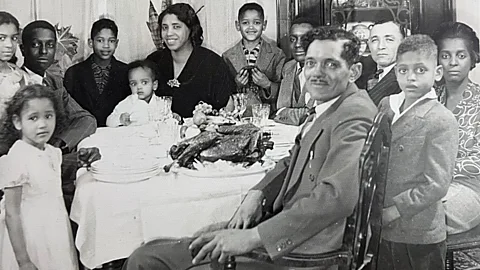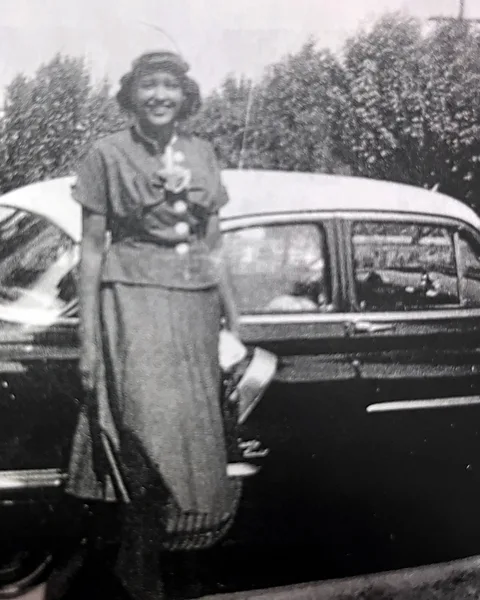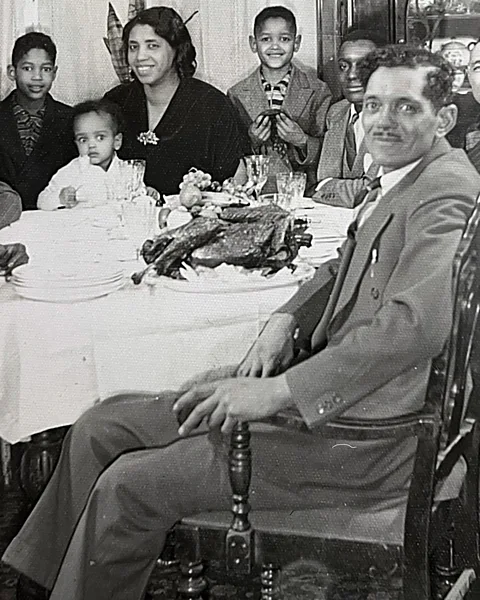The family secrets kept for generations
 Alexandria Gamlin
Alexandria GamlinMany families have a hidden past that is often never spoken about – Cagney Roberts explores what impact these can have after his friend Alexandria Gamlin revealed her own family's secret.
Last year, my friend Alex came to visit me in London from the US. We met over 10 years ago in New York City: I am a Black British Londoner, and Alex is originally from Michigan. During her visit, we talked about our careers, our families – and family secrets.
It turned out that Alex's family kept a huge secret in the past, one to do with race, identity and belonging. Her revelation prompted us to investigate why some families are forced to keep secrets in the first place – and what psychologists can tell us about the impact of those secrets on our mental and physical health.
But I'll let Alex tell her story first, in her own words.
Alexandria Gamlin: My great-grandfather Walter
My grandmother has often told me the story of her grandmother, a woman called Lulu May. She was born in the 19th Century on a plantation in Newberry, South Carolina where her parents had been enslaved. As a young woman, Lulu May was raped by the white plantation owner. This resulted in the birth of my grandmother's father, my great-grandfather Walter, born at the turn of the 20th Century.
Although enslavement in the US officially ended in 1865, for Black people in many southern states, like South Carolina, emancipation did not mean the end of subservience. Fundamental aspects of enslavement continued under laws passed that meant Black citizens entered into contracts of service or labour with their former white enslavers, who would continue to be known as their "masters". Segregation and discrimination were reinforced under these so-called Jim Crow systems of racist laws well into the 20th Century.
However, unlike most babies born in such circumstances, my light-skinned great-grandfather grew up keenly aware of who his father was. He spent most of his youth with his white half-siblings in the "main house", where the plantation owner and his family lived, while the workers and former slaves lived in shacks.
"I just know he didn't have to work in cotton fields and do all that hard work, because he stayed up at the house of his master, who was really his father, because he was a firstborn to this Miss Lulu May, a young maiden woman," says my grandmother, Recalia Ruth Davis Childress.
Lulu May later married a Black man and had more children, Walter's younger brothers, who lived in a shack on the plantation.
When Walter became a teenager, he joined the US military and later served in World War One.
It may have been around that time, or perhaps even earlier, that Walter made the decision to navigate the world passing as a white man.
 Alexandria Gamlin
Alexandria GamlinThe history of racial "passing" in the US – the decision to pass as white, in response to severe discrimination and violent racism – is somewhat patchily documented. It tends to be guarded by families rather than officially recorded. One reason is of course that the decision was a secret. In addition, Black American families can also generally find it hard to trace their history, due to enslavement, which ended in 1865, and the way census records were kept over time.
In some cases, "passing" did not involve actively claiming to be white, but just not correcting other people when they made that assumption. In others, it involved elaborate schemes in a desperate bid for freedom and safety, as in the case of Ellen and William Craft, a married couple who escaped from southern Georgia to the North in the mid-1800s. Ellen passed as a white man, and William as her personal servant.
Brian Lowery is a social psychologist at Stanford University and the author of the book Selfless: The Social Creation of You, on identity and how our social world shapes us. He defines racial passing as a somewhat fluid concept: "[It can describe] when people go out into the world and allow others to see you as racially something other than what you are. It could also mean, what race you believe yourself to be."
Passing offered tangible benefits at a time when African American families not only faced many barriers, but the disparity in opportunities were encoded through the legal system. "So, if someone could access those benefits, they would, if there was more to be gained," says Lowery. "The need to do this was primarily because of the nature of the system." However, "it was very dangerous to 'pass' then".
There was also the psychological burden of leaving behind one's old identity and community. In Alysson Hobbs' book The Chosen Exile of Racial Passing, she talks about a young and ambitious woman named Elsie Roxborough who decided to racially pass as white and sever all ties with her family, in the hope of achieving her dreams more easily, which in many cases could mean a better job, the right to vote and the opportunity to live in a better neighbourhood. Later, Elsie, now named Mona Monet, asked for financial help from her biological father, who refused. A few days later, she took her own life.
"I think for people who passed it had to be devastating for them and for their family. Imagine what it would be like to cut all ties with your family and your friends," Lowery says. "The cost to family and to the person who had to do it psychologically would have been immense." In his view, it says a lot about the society at that time, and the brutality it inflicted on African Americans, that people were ready to bear that burden.
My great-grandfather did not sever ties with his loved ones. Instead, he passed in public, but not in private. His appearance gave him the opportunity to buy land in Michigan when he returned from the war. This shaped the trajectory of my entire bloodline.
"[The man who sold the farm] was a prejudiced kind of guy and then selling this 40-acre farm to a Black person [wasn't something he would do]," my grandmother says. So Walter "said he wasn't Black, he was Indian or something, anything but Black, that's how prejudiced people were."
In private, my great-grandfather lived life as a proud Black man. He married, raised his family on that land and later passed it down to his children. It sustained several generations and is the same land my mother grew up on. In my family, his story is told with affection: he did what he had to do to survive and thrived against the odds. In fact, he helped his brothers leave South Carolina, too.
"He sent for his brothers out of the South to come North. And that's how a lot of Black people got out of the South, a family member got them out of the South, and away from there," my grandmother says. Although slavery had long ended, "they had to leave in the night, to get away" so the plantation owner wouldn't know they were leaving. "You didn't leave, you stayed on that plantation, is what it really was."
In my family, it's hard to say what the true impact of Walter's passing was, and how much secrecy it involved. At least Walter didn't have to lie to his wife and children – as some had to, if they married white women. His loved ones always knew. But what about the wider community? Were there moments when he was in danger, when he feared that he had misjudged the situation and might be found out any minute?
As with many family stories, there are aspects we will never know. When I spoke to my grandmother for this article, I found out that she identifies as mixed race, which I hadn't realised before. "I never considered myself one particular race, I was mixed," she says. "We're called Americans, a little bit of everything."
I don't know for sure who the first person was to tell Walter's secret to someone outside the family. But they must have been sure that the circumstances had changed enough, and that it was safe to tell.
Does this pride in my ancestor's will to survive affect the impact of the secret on my family – potentially making it a source of strength, rather than pain and trauma? Cagney asked leading experts on secret-keeping about the long-term impact of guarding a secret, and their answers were surprising.
Cagney Roberts: How secrets affect us
Researchers have discovered that secrets are surprisingly common. In fact, many of us even keep a whole collection of them.
Psychologist Michael Slepian is one of the leading experts on the psychology of secrets and author of The Secret Life of Secrets. His studies have found that people keep about 13 secrets at any one time on average, five of which they've never told anyone. Other secrets may be kept mostly confidential but revealed to some people, depending on the type of secret. Experiences such as drug use or dissatisfaction with one's job are more likely to be shared with at least some others, the studies suggest, while experiences and feelings such as romantic desire or sexual behaviour are "consistently the top secrets shared with no one".
Slepian and his collaborators have developed a list of 38 common categories these secrets fall into. They cover a vast range of subjects: beliefs, family, finances, ambitions, habits, hobbies, drug use, mental health struggles, cheating, work, relationships, sex and more. The most common ones, in this order, are related to having told a significant lie (and keeping that secret); having a romantic desire whilst single; and secrets around money and personal finances.
 Alexandria Gamlin
Alexandria GamlinAs in the case of Walter's passing, which was known to his family but not the outside world, the distinction between privacy and secrecy is not always clear-cut.
"There can be some grey areas between privacy and a secret," Slepian says. Some people may not want to talk about money and sex, for example, for privacy reasons. "But when it becomes a secret, it's not just that someone doesn't know this thing about you, but it's that you intend for them to not learn this information."
Despite being so common, having secrets can come at a cost.
"People keep secrets for all kinds of reasons but mainly to protect relationships, themselves or others. Secrets become harmful when a relationship is injured, or when it haunts the secret holder," says Evan Imber-Black, professor of marriage and family therapy at Mercy College in New York.
Evidence from Slepian's studies also suggests that secrets can hurt their holders. Keeping a secret has been associated with a lower life satisfaction, lower quality relationships, and symptoms of poor psychological and physical health. One might think this is due to the stress and anxiety of having to conceal something from others, but Slepian says the real reasons are more complex.
"The idea that our secrets hurt us mostly because hiding them is difficult and stressful turns out to be wrong," he says. "Our secrets do hurt us, but often for other reasons associated with feelings of shame, isolation, and inauthenticity. These experiences can leave us feeling helpless, and holding a secret back in conversation is just a small slice of the pain and stress caused by secrets."
In the case of Alex's family, there must have been times when keeping the secret did cause stress and pain. But was the impact different because it was a survival mechanism?
Lowery suggests the impact of passing may ripple through the generations, but the wider context of oppression may have an even stronger impact.
"There's a good chance there is some acute trauma or tragedy that happens that shapes individuals whose families racially passed, that then affects how people behave today," he says. "It might cause a lack of identity with multiple generations untraceable. However, that trauma is really a reflection of the incredible degradations of the whole state system, which all of the black community have been subjected to in some way."
Still, the individual impact of a secret can vary. Alex says she feels empowered by her family's hidden history, and her ancestor's courage. It makes her feel fearless, and secure in herself and her lineage.
For those who feel less positive about their family's secret, Slepian has some advice: think about how keeping the secret makes you feel. If the answer is "guilty", it may be time to learn from the past, and make a different choice in the present – including perhaps being more open.
"When people feel guilty, they become motivated to do something about it. You can't change the past, no matter how much you wish it were so. But you can move in the right direction today and can continue to do so tomorrow."
--
